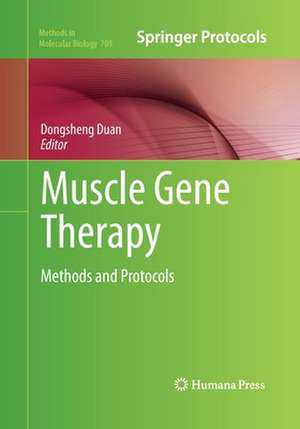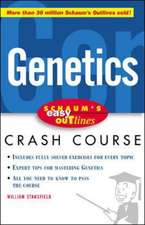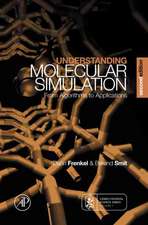Muscle Gene Therapy: Methods and Protocols: Methods in Molecular Biology, cartea 709
Editat de Dongsheng Duanen Limba Engleză Paperback – 23 aug 2016
| Toate formatele și edițiile | Preț | Express |
|---|---|---|
| Paperback (2) | 1035.89 lei 6-8 săpt. | |
| Humana Press Inc. – 23 aug 2016 | 1035.89 lei 6-8 săpt. | |
| Springer – 8 sep 2014 | 1283.34 lei 6-8 săpt. | |
| Hardback (1) | 735.46 lei 6-8 săpt. | |
| Humana Press Inc. – 10 ian 2011 | 735.46 lei 6-8 săpt. |
Din seria Methods in Molecular Biology
- 9%
 Preț: 791.63 lei
Preț: 791.63 lei - 23%
 Preț: 598.58 lei
Preț: 598.58 lei - 20%
 Preț: 882.98 lei
Preț: 882.98 lei -
 Preț: 252.05 lei
Preț: 252.05 lei - 5%
 Preț: 802.70 lei
Preț: 802.70 lei - 5%
 Preț: 729.61 lei
Preț: 729.61 lei - 5%
 Preț: 731.43 lei
Preț: 731.43 lei - 5%
 Preț: 741.30 lei
Preț: 741.30 lei - 5%
 Preț: 747.16 lei
Preț: 747.16 lei - 15%
 Preț: 663.45 lei
Preț: 663.45 lei - 18%
 Preț: 1025.34 lei
Preț: 1025.34 lei - 5%
 Preț: 734.57 lei
Preț: 734.57 lei - 18%
 Preț: 914.20 lei
Preț: 914.20 lei - 15%
 Preț: 664.61 lei
Preț: 664.61 lei - 15%
 Preț: 654.12 lei
Preț: 654.12 lei - 18%
 Preț: 1414.74 lei
Preț: 1414.74 lei - 5%
 Preț: 742.60 lei
Preț: 742.60 lei - 20%
 Preț: 821.65 lei
Preț: 821.65 lei - 18%
 Preț: 972.30 lei
Preț: 972.30 lei - 15%
 Preț: 660.49 lei
Preț: 660.49 lei - 5%
 Preț: 738.41 lei
Preț: 738.41 lei - 18%
 Preț: 984.92 lei
Preț: 984.92 lei - 5%
 Preț: 733.29 lei
Preț: 733.29 lei -
 Preț: 392.60 lei
Preț: 392.60 lei - 5%
 Preț: 746.26 lei
Preț: 746.26 lei - 18%
 Preț: 962.66 lei
Preț: 962.66 lei - 23%
 Preț: 860.22 lei
Preț: 860.22 lei - 15%
 Preț: 652.64 lei
Preț: 652.64 lei - 5%
 Preț: 1055.50 lei
Preț: 1055.50 lei - 23%
 Preț: 883.87 lei
Preț: 883.87 lei - 19%
 Preț: 491.89 lei
Preț: 491.89 lei - 5%
 Preț: 1038.86 lei
Preț: 1038.86 lei - 5%
 Preț: 524.16 lei
Preț: 524.16 lei - 18%
 Preț: 2122.34 lei
Preț: 2122.34 lei - 5%
 Preț: 1299.23 lei
Preț: 1299.23 lei - 5%
 Preț: 1339.12 lei
Preț: 1339.12 lei - 18%
 Preț: 1390.26 lei
Preț: 1390.26 lei - 18%
 Preț: 1395.63 lei
Preț: 1395.63 lei - 18%
 Preț: 1129.65 lei
Preț: 1129.65 lei - 18%
 Preț: 1408.26 lei
Preț: 1408.26 lei - 18%
 Preț: 1124.92 lei
Preț: 1124.92 lei - 18%
 Preț: 966.27 lei
Preț: 966.27 lei - 5%
 Preț: 1299.99 lei
Preț: 1299.99 lei - 5%
 Preț: 1108.51 lei
Preț: 1108.51 lei - 5%
 Preț: 983.76 lei
Preț: 983.76 lei - 5%
 Preț: 728.16 lei
Preț: 728.16 lei - 18%
 Preț: 1118.62 lei
Preț: 1118.62 lei - 18%
 Preț: 955.25 lei
Preț: 955.25 lei - 5%
 Preț: 1035.62 lei
Preț: 1035.62 lei - 18%
 Preț: 1400.35 lei
Preț: 1400.35 lei
Preț: 1035.89 lei
Preț vechi: 1090.40 lei
-5% Nou
Puncte Express: 1554
Preț estimativ în valută:
198.24€ • 206.20$ • 163.66£
198.24€ • 206.20$ • 163.66£
Carte tipărită la comandă
Livrare economică 14-28 aprilie
Preluare comenzi: 021 569.72.76
Specificații
ISBN-13: 9781493961825
ISBN-10: 1493961829
Pagini: 382
Ilustrații: XIII, 382 p.
Dimensiuni: 178 x 254 mm
Greutate: 0.69 kg
Ediția:Softcover reprint of the original 1st ed. 2011
Editura: Humana Press Inc.
Colecția Humana
Seria Methods in Molecular Biology
Locul publicării:Totowa, NJ, United States
ISBN-10: 1493961829
Pagini: 382
Ilustrații: XIII, 382 p.
Dimensiuni: 178 x 254 mm
Greutate: 0.69 kg
Ediția:Softcover reprint of the original 1st ed. 2011
Editura: Humana Press Inc.
Colecția Humana
Seria Methods in Molecular Biology
Locul publicării:Totowa, NJ, United States
Cuprins
Design and Testing of Regulatory Cassettes for Optimal Activity in Skeletal and Cardiac Muscle.- Codon Optimization of the Micro-Dystrophin Gene for Duchene Muscular Dystrophy Gene Therapy.- Monitoring Duchenne Muscular Dystrophy Gene Therapy with Epitope-Specific Monoclonal Antibodies.- Methods for Non-Invasive Monitoring of Muscle Fiber Survival with an AAV Vector Encoding the mSEAP Reporter Gene.- Monitoring Murine Skeletal Muscle Function for Muscle Gene Therapy.- Phenotyping Cardiac Gene Therapy in Mice.- Golden Retriever Muscular Dystrophy (GRMD): Developing and Maintaining a Colony and Physiological Functional Measurements.- Directed Evolution of Adeno-Associated Virus (AAV) as Vector for Muscle Gene Therapy.- Systemic Gene Transfer to Skeletal Muscle Using Reengineered AAV Vectors.- Bioinformatic and Functional Optimization of Antisense Phosphorodiamidate Morpholino Oligomers (PMOs) for Therapeutic Modulation of RNA Splicing in Muscle.- Engineering Exon-Skipping Vectors Expressing U7snRNA Constructs for Duchenne Muscular Dystrophy Gene Therapy.- Application of MicroRNA in Cardiac and Skeletal Muscle Disease Gene Therapy.- Molecular Imaging of RNA Interference Therapy Targeting PHD2 for Treatment of Myocardial Ischemia.- Lentiviral Vector Delivery of shRNA into Cultured Primary Myogenic Cells: A Tool for Therapeutic Target Validation.- Fetal Muscle Gene Therapy/Gene Delivery in Large Animals.- Electroporation of Plasmid DNA to Swine Muscle.- Local Gene Delivery and Methods to Control Immune Responses in Muscles of Normal and Dystrophic Dogs.- Gene Transfer to Muscle from the Isolated Regional Circulation.- AAV-Mediated Gene Therapy to the Isolated Limb in Rhesus Macaques.- Antisense Oligo-Mediated Multiple Exon-Skipping in a Dog Model of Duchenne Muscular Dystrophy.- Whole Body Skeletal Muscle Transduction in Neonatal Dogs with AAV-9.- A Translatable, Closed Recirculation System for AAV6 Vector-Mediated Myocardial Gene Delivery in the Large Animal.- Method of Gene Delivery in Large Animal Models of Cardiovascular Diseases.- Percutaneous Transendocardial Delivery of Self-Complementary Adeno-Associated Virus 6 in the Canine.
Textul de pe ultima copertă
Gene therapy offers many conceptual advantages to treat muscle diseases, especially various forms of muscular dystrophies; however, it faces a number of unique challenges, including the need to deliver a therapeutic vector to all muscles throughout the body. In Muscle Gene Therapy: Methods and Protocols, expert researchers in the field present a collection of techniques aimed at bridging the translational gap in muscle gene therapy between the prevalent rodent models and vitally important larger animal models. Divided into three sections, this volume examines basic protocols for optimizing the muscle gene expression cassette and for evaluating the therapeutic outcomes, new developments in muscle gene therapy technology such as adeno-associated viral vector (AAV), oligonucleotide-mediated exon-skipping, and novel RNA-based strategies, and step-by-step guidance on muscle gene delivery in swine, ovine, canine, and non-human primates. Written in the highly successful Methods in Molecular Biology™ series format, chapters include introductions to their respective topics, lists of the necessary materials and reagents, detailed, readily reproducible laboratory protocols, and tips on troubleshooting and avoiding known pitfalls.Authoritative and cutting-edge, Muscle Gene Therapy: Methods and Protocols serves as an invaluable resource for graduate students, post-doctoral fellows, and principle investigators pursuing the crucial advancement of muscle disease gene therapy in the hope of someday curing these debilitating disorders.
Caracteristici
Presents a comprehensive collection of state-of-the-art muscle gene therapy protocols from leaders in the field Focuses on gene delivery in less-covered large animal models, such as swine, ovine, canine, and non-human primates Contains tips from the experts highlighting key implementation advice and strategies Includes supplementary material: sn.pub/extras
Descriere
Descriere de la o altă ediție sau format:
Muscle disease represents an important health threat to the general population. Unlike diseases affecting other tissues/organs, therapeutic options are quite limited for many inherited muscle diseases such as Duchenne muscular dystrophy. There is essentially no cure. Gene therapy holds great promise to correct the genetic defects and eventually achieve full recovery in these diseases. Significant progresses have been made in the field of muscle gene therapy over the last few years. A variety of new strategies, such as exon-skipping and RNAi, have greatly expanded the scope of muscle gene therapy beyond the traditional gene replacement approach. The development of novel gene delivery vectors has substantially enhanced specificity and efficiency of muscle gene delivery. The new knowledge on the immune response to viral vectors has added new insight in overcoming the immune obstacles. Most importantly, the field has finally moved from small experimental animal models to human patients. This book will bring together the leaders in the field of muscle gene transfer to provide an updated overview on the progress of muscle gene therapy. It will also highlight important clinical applications of muscle gene therapy.
Muscle disease represents an important health threat to the general population. Unlike diseases affecting other tissues/organs, therapeutic options are quite limited for many inherited muscle diseases such as Duchenne muscular dystrophy. There is essentially no cure. Gene therapy holds great promise to correct the genetic defects and eventually achieve full recovery in these diseases. Significant progresses have been made in the field of muscle gene therapy over the last few years. A variety of new strategies, such as exon-skipping and RNAi, have greatly expanded the scope of muscle gene therapy beyond the traditional gene replacement approach. The development of novel gene delivery vectors has substantially enhanced specificity and efficiency of muscle gene delivery. The new knowledge on the immune response to viral vectors has added new insight in overcoming the immune obstacles. Most importantly, the field has finally moved from small experimental animal models to human patients. This book will bring together the leaders in the field of muscle gene transfer to provide an updated overview on the progress of muscle gene therapy. It will also highlight important clinical applications of muscle gene therapy.













